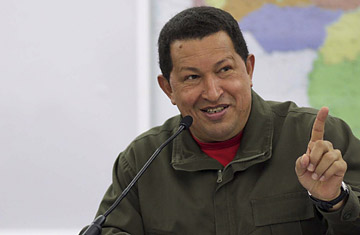
President of Venezuela Hugo Chávez
With Halloween just six weeks away, Venezuelan President Hugo Chávez is doing his best to alarm the White House by summoning up some Cold War ghosts. Late Thursday, he ordered U.S. Ambassador Patrick Duddy to leave Venezuela within 72 hours, annoucing that he was withdrawing his own ambassador from Washington as well — moves, he said, that were taken in solidarity with Bolivia's President Evo Morales, who had expelled his country's U.S. ambassador a day earlier. Earlier on Thursday, Chávez had welcomed two Russian Tu-160 long-range bombers into Venezuela, where they'll spend some days conducting training flights before returning home. But the first foray by Russian strategic bombers into the Western hemisphere since the Cold War is simply the curtain raiser for joint naval maneuvers that will bring Russian warships into Venezuelan waters in November.
The war games were announced by Chávez last weekend during his regular "Alo Presidente" broadcast. Russia will send its missile cruiser Peter the Great and the anti-submarine vessel Admiral Shabanenko, as well as two other vessels, sometime in November, and they are to be joined by a unit of Russian long-range anti-submarine patrol aircraft that will be temporarily stationed at one of Venezuela's air bases. Coming on the heels of Russia's military action against U.S. ally Georgia, the November exercise will likely be seen by Washington as an act of geopolitical theater by Moscow, one that sends a warning that if the U.S. sees fit to make military alliances in Russia's backyard, then Russia is able to do likewise.
Both Chávez and the Russians, however, insist that the exercises were planned long before the Georgia debacle and that they are a natural outgrowth of expanding Venezuelan-Russian military cooperation. On his most recent visit to Russia, in July, Chávez purchased more than a dozen anti-aircraft systems and three "Varshavianka"-class submarines, bringing his total expenditure on Russian arms in the past four years to $4.5 billion. Purchases include 53 Russian helicopters and 24 Sukhoi fighter planes, and there's even talk of installing a Kalashnikov-rifle factory here sometime next year.
During that visit, Chávez hailed Russia as an ally but denied that Moscow would be allowed to build military bases in Venezuela — Article 13 of Venezuela's constitution forbids any foreign military bases on national territory. But retired Vice Admiral Mario Ivan Carratu sees the November exercise as a first step toward allowing Russian bases in Venezuela.
Just as Georgia is strategically located on a crucial energy route along Russia's southern periphery, Venezuela's location in the Caribbean makes it a key gateway to the oil economy of the Gulf of Mexico. Carratu believes that for Moscow, the planned naval exercise is a tit-for-tat response to U.S. efforts to recruit former Soviet territories for NATO, but that Venezuela makes itself vulnerable by substituting for the role played by Cuba ahead of the 1962 missile crisis.
But Chávez supporters see the alliance with Russia as simply a prudent hedge against a possible U.S.-led invasion. Venezuela is forced to purchase arms from Russia, argues one Chávista who preferred to remain anonymous, because the U.S. has banned weapons sales to the country and has pressured its allies to do likewise.
Russian media quoted military spokesman Captain Igor Digalo as saying the role of the Russian vessels would be confined to search-and-rescue and communications exercises. Foreign Ministry spokesman Andréi Nesterenko stressed in a briefing that the maneuvers had been planned before Russia entered into any conflict with Georgia. In Washington, however, the move is likely to be seen as a provocation — particularly coming as it does in sequence with the expulsion of Ambassador Duddy.
"Traditionally, Venezuela has engaged in joint military operations with numerous countries," says military expert Carlos Hernandez. "It is a common practice that allows our military to learn from others. What does seem provocative is to call Russia an ally in a moment in which the tensions between this country and the U.S. are escalating."
Despite government denials, however, Chávez's defiant response to criticism over the planned naval exercises seems to underscore the idea that they are intended as a message to Washington. Speaking on his weekly TV program, the Venezuelan leader said of concerns about the planned maneuvers, "Go ahead, Yankees, whine!"
